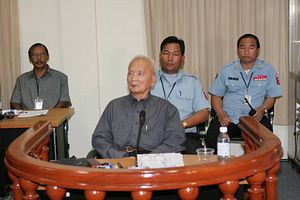The Trial Chamber at the Khmer Rouge tribunal has outlined its strategy for Case 002/02, which will see additional charges laid against surviving leaders of Pol Pot’s regime, blamed for the deaths of up to 2.2 million people between April 1975 and early 1979.
Former Khmer Rouge head of state Khieu Samphan and Nuon Chea, aka Brother Number Two, will now face charges relating to genocide, forced marriages and rape along with allegations of mistreatment of Buddhists, internal purges and the targeting of officials who belonged to the previous government.
Both men are currently awaiting a verdict for crimes against humanity in Case 002/01, which focused on the forced eviction of the capital’s population after the Khmer Rouge takeover.
The verdict is expected in July. Case 001 resulted in a life sentence for Kaing Guek Eav, alias Duch, a former math teacher who ran the S-21 torture and extermination center.
Under Duch’s stewardship, water boarding, asphyxiation and electrification were widely practiced, alongside disembowelment. Operations were performed on prisoners without anesthetic. All were processed and documented with forced confessions elicited before being sent to the nearby Killing Fields. There they were bludgeoned to death with an iron bar to the nape of the neck.
The court has heard that Duch answered to Nuon Chea in addition to Pol Pot, who died in 1998, supposedly of heart failure.
Genocide charges will focus on the extermination of Muslim Cham and ethnic Vietnamese.
The Extraordinary Chambers in the Courts of Cambodia (ECCC) also said that four security centers, three worksites and one cooperative would help form the basis for Case 002/02, adding that it had made its decision based on a variety of interests, human rights and principles of efficiency.
“Important factors in this analysis included the potential prejudice to the accused’s rights, the efficiency and manageability of the proceedings, the desire to avoid inconsistencies between separate trials and the potential burden on witnesses.”
It also said it was important to ensure that at least part of the charges were adjudicated within the lifespan of the accused. Nuon Chea is 87 and Khieu Samphan 82. Their advanced years have raised fears they will die before justice can be rendered.
Other senior leaders have already died of old age, or in many cases met a more grisly end. One other senior leader, Ieng Thirith, 82, has been ruled mentally unfit for trial, a decision that has been criticized in some quarters for being too expensive as well as taking too long.
Funding has also been an issue. However the United Nations has struck a deal with the Cambodian government to ensure it maintains its financial backing for the Khmer side of the court, while countries such as Australia and Japan will continue to provide support. New Zealand and Norway have also made contributions in the millions of dollars.
To date the ECCC has cost more than $200 million, or about $100 for each person who died under the ultra-Maoists. The court estimates that about 800,000 people were killed violently under Pol Pot, while the rest died through forced labor, starvation and denial of clean water, sanitation and medicine.
The Trial Chamber at the ECCC said parties would now be invited to file witness, expert and Civil Party lists, as well as a list of documents to be offered as evidence in Case 002/02. Initial hearings will then be scheduled.
Sources at the court have said hearings were expected to begin later this year.
Luke Hunt can be followed on Twitter @lukeanthonyhunt

































